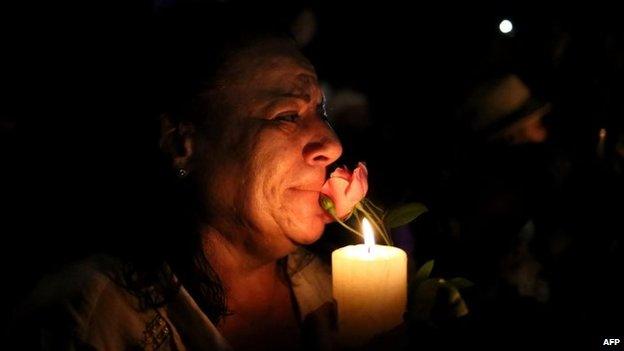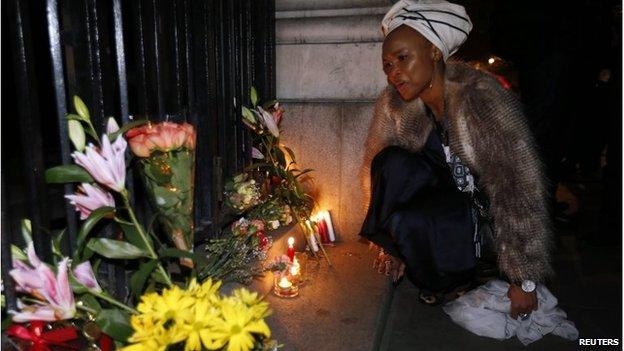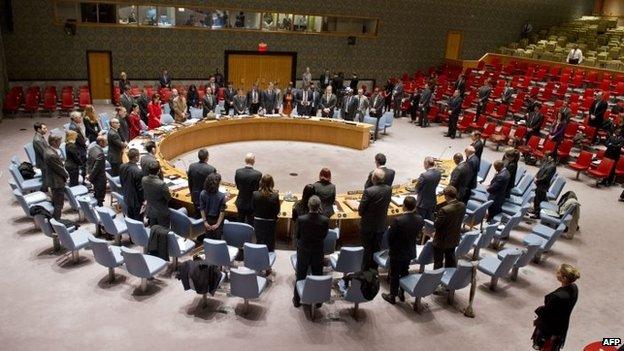South Africa's Nelson Mandela dies in Johannesburg
- Published
The announcement of Mandela's death was made by President Jacob Zuma
South Africa's first black president and anti-apartheid icon Nelson Mandela has died at the age of 95.
Mr Mandela led South Africa's transition from white-minority rule in the 1990s, after 27 years in prison for his political activities.
He had been receiving intensive medical care at home for a lung infection after spending three months in hospital.
Announcing the news on South African national TV, President Jacob Zuma said Mr Mandela was at peace.
"Our nation has lost its greatest son," Mr Zuma said.
The BBC has compiled scenes from around the globe in the hours after Nelson Mandela's death as world leaders, South Africans, and our own journalists react.
"Although we knew that this day would come, nothing can diminish our sense of a profound and enduring loss."
Mr Zuma said Mr Mandela - who is known affectionately by his clan name, Madiba - had died shortly before 21:00 local time (19:00 GMT). He said he would receive a full state funeral, and flags would be flown at half-mast.
Crowds have gathered outside the house where Mr Mandela died, some flying South African flags and wearing the shirts of the governing African National Congress, which Mr Mandela once led.
The Nobel Peace Prize laureate was one of the world's most revered statesmen after preaching reconciliation despite being imprisoned for 27 years.
He had rarely been seen in public since officially retiring in 2004. He made his last public appearance in 2010, at the football World Cup in South Africa.
His fellow campaigner against apartheid, Archbishop Desmond Tutu, said he was "not only an amazing gift to humankind, he made South Africans and Africans feel good about being who we are. He made us walk tall. God be praised."
BBC correspondents say Mr Mandela's body will be moved to a mortuary in the capital, Pretoria, and the funeral is likely to take place next Saturday.
'Bid him farewell'
Mr Zuma said in his statement that "what made Nelson Mandela great was precisely what made him human. We saw in him what we seek in ourselves.
"Fellow South Africans, Nelson Mandela brought us together and it is together that we will bid him farewell."
Tributes have come in from around the world. UN Secretary General Ban Ki-moon said he was "a giant for justice and a down-to-earth human inspiration".
"Many around the world were greatly influenced by his selfless struggle for human dignity, equality and freedom. He touched our lives in deeply personal ways."
US President Barack Obama said Mr Mandela achieved more than could be expected of any man.
"He no longer belongs to us - he belongs to the ages," he said, adding that Mr Mandela "took history in his hands and bent the arc of the moral universe towards justice".
Mr Obama, the first black president of the United States, said he was one of the millions who drew inspiration from Mr Mandela's life. He has ordered that the White House flag be flown at half-mast.
FW de Klerk, who as South Africa's last white president ordered Mr Mandela's release, called him a "unifier" and said he had "a remarkable lack of bitterness".
He told the BBC Mr Mandela's greatest legacy "is that we are basically at peace with each other notwithstanding our great diversity, that we will be taking hands once again now around his death and around our common sadness and mourning".
The Elders - a group of global leaders set up by Mr Mandela to pursue peace and human rights - said they "join millions of people around the world who were inspired by his courage and touched by his compassion".
The group's chair, Kofi Annan, said the world had lost "a clear moral compass".
"While I mourn the loss of one of Africa's most distinguished leaders, Madiba's legacy beckons us to follow his example to strive for human rights, reconciliation and justice for all."
UK Prime Minister David Cameron said "a great light has gone out in the world".
Earlier this year, Mr Mandela spent nearly three months in hospital with a recurring lung infection.
He was moved to his home in the Houghton suburb of Johannesburg in September, where he continued to receive intensive care.
Robben Island
Born in 1918, Nelson Mandela joined the African National Congress (ANC) in 1943, as a law student.

Many of those gathered outside the former leader's home were reduced to tears at the news

In London mourners placed flowers outside the African High Commission - among them the daughter of Archbishop Desmond Tutu, Lungi Morrison

The UN Security Council in New York stood for a minute of silence
He and other ANC leaders campaigned against apartheid. Initially he campaigned peacefully but in the 1960s the ANC began to advocate violence, and Mr Mandela was made the commander of its armed wing.
He was arrested for sabotage and sentenced to life imprisonment in 1964, serving most of his sentence on Robben Island.
FW de Klerk: Mandela "was a great unifier"
It was forbidden to quote him or publish his photo, but he and other ANC leaders were able to smuggle out messages of guidance to the anti-apartheid movement.
He was released in 1990 as South Africa began to move away from strict racial segregation - a process completed by the first multi-racial elections in 1994.
Mr Mandela, who had been awarded the Nobel Prize in 1993 jointly with Mr de Klerk, was elected South Africa's first black president. He served a single term, stepping down in 1999.
After leaving office, he became South Africa's highest-profile ambassador, campaigning against HIV/Aids and helping to secure his country's right to host the 2010 football World Cup.
He was also involved in peace negotiations in the Democratic Republic of Congo, Burundi and other countries in Africa and elsewhere.
A look back at the life of Nelson Mandela